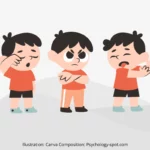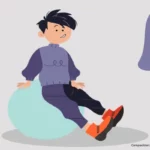
The closest relationships are also often the most complex. The more we love a person or the more time we spend with him, the more intense the emotions involved and the more likely conflicts will arise. The relationship between parents and children does not escape this rule. And the arrival of a daughter-in-law or son-in-law doesn’t always make things easier. In fact, sometimes it widens the gap even more, leading to a gradual distancing or even an express break with the family of origin.
Looking for a scapegoat to blame
A study conducted at Ohio State University with more than 1,000 mothers who had estranged from their adult children, revealed that almost 80% of them believed that their son’s partner or ex-husband had turned them against him.
Although this study only looked at the opinions of mothers, its results are in line with other research that suggests that fathers and children often disagree on the reasons for breakup. “There is a real disconnect between what mothers are saying and what their adult children are saying about why they don’t talk,” the psychologists noted.
Interestingly, disagreements in values or the way they see the world were only mentioned by a third of the mothers as the cause of the breakup and only 18% said that the fault for the estrangement was theirs.
Contradictorily, it is more common for adult children to explain their estrangement from parents as a result of emotional abuse, conflicting role expectations, and personality clashes.
Many mothers and fathers see their children as an extension of themselves, which means that they have a hard time seeing the flaws and shadows of their offspring. They often develop an idealized image of themselves that leads them to think that they are the most intelligent, kind, or competent in the world.
It is not necessarily a negative thing. In fact, seeing the people we love in a more flattering light actually makes relationships easier. If we only focused on their flaws, we would probably fuel conflicts and end up kicking them out of our lives. That positive bias helps us forgive their mistakes, be more understanding, and act with patience.
However, sometimes it can also cloud the perception of what is happening, transferring the responsibility for the events outside of the dyad of the relationship. It is easier to think that there is an external culprit than to change the image we have of ourselves as parents or of our children.
In other words, it is easier to find a scapegoat than to admit that something is not right in the relationship and we must work to change it. For this reason, parents often blame the newcomer to the family and blame the sons-in-law or daughters-in-law for the distance. They are not always wrong, or at least not 100%.
The other side of the story
All the experiences we live influence us, in one way or another. Sometimes these are small and imperceptible changes, other times they can be a real tsunami. The relationship of a couple also transforms us. Putting our life in common with that of another person implies a process of negotiating values, habits and ways of seeing the world. Some of those changes will be positive, others perhaps not so much.
Parents can notice these changes in their children and feel uncomfortable with them, especially when they are hard to fit in or stray too far from family traditions. So they tend to see the newcomer as the culprit of that “brainwashing.”
In some cases, they are not wrong. When a person has emotional problems or is insecurely attached, he may feel threatened by his partner’s relationship with family or friends, especially when it is a very close relationship. Therefore, he can more or less consciously encourage the dissolution of those ties. This guarantees all the attention and love of the partner.
This phenomenon is more common in men, who tend to be more “at the mercy” of their partners, mainly due to the need to express their masculinity and their desire for protection. As a result, it may be easier to manipulate them by resorting to hurtful phrases like “you’re a mama’s son.” It is also more common for men to break up with their family of origin because they generally prefer to avoid conflict in a love relationship, so they are more likely to give in to their partner’s wishes, even if it means distancing themselves from their parents.
In other cases, this distancing is due to differences in the value system and way of seeing the world. If the partner perceives that the parents are too invasive or try to impose their customs and ideas, it is likely that he/she will end up putting pressure on the son/daughter to establish a safe distance from his/her parents. This problem usually becomes more evident or worsens when the children are born if the grandparents try to impose their method of upbringing.
What to do when your child is turned against you? Recovering the relationship by burying the hatchet
In our society, the relationship between parents and their children is expected to last a lifetime. There is the idea that it is an indestructible love bond that can survive any ups and downs. However it is not always so.
When that bond breaks down and parents are unable to maintain the relationship they would like with their children, they may feel that they have failed in their role, leading to intense feelings of hurt and shame. However, if you want to get the relationship back, it’s important to get out of the blame mindset.
Regardless of who is to blame, the challenge is to understand what has gone wrong in the relationship and try to fix it. Blaming the daughter-in-law or son-in-law will not bring the son back. On the contrary, it often generates the opposite reaction and drives him/her further and further away.
Guilts and recriminations end up adding more tension, so that children will probably withdraw even further, if only to escape their parents’ reproaches. In fact, many times children simply distance themselves because they can’t stand the conflict, so they take the easy path.
To bury the hatchet and recover the relationship, it is important that everyone keep in mind that each generation sees things differently, so you have to make an effort to put yourself in the other’s place.
The social changes we have experienced in recent years, for example, have widened the gap between what is considered appropriate parenting behavior, so that what is appropriate for young parents may not be appropriate for grandparents. And vice versa.
Perspectives on what is considered abusive, harmful, neglectful, or traumatic have also changed quite a bit, so that what was once considered normal can now be seen as too intrusive or even abusive. To repair the relationship, you often have to close those gaps and come closer together, which means that everyone has to make concessions.
Often this also means updating the child’s image to include the changes he has experienced – even the ones we don’t like – and understanding that he is building his own family, so the relationship may not be the same as it used to be.
Ultimately, the key is to add value to the lives of our children and, of course, to that of our daughters-in-law or sons-in-law. To do this, you have to listen to them and understand their needs. Try to adapt and give them space. Although that, of course, does not mean giving in to everything or adopting a submissive attitude. We must demand the same respect and tolerance that is offered.
Sources:
Schoppe-Sullivan, S. J., et. Al. (2021) Mothers’ attributions for estrangement from their adult children. Couple and Family Psychology: Research and Practice; 85856-001.
Carr, K. et. Al. (2015) Giving Voice to the Silence of Family Estrangement: Comparing Reasons of Estranged Parents and Adult Children in a Non-matched Sample. Journal of Family Communication; 15: 10.1080.



